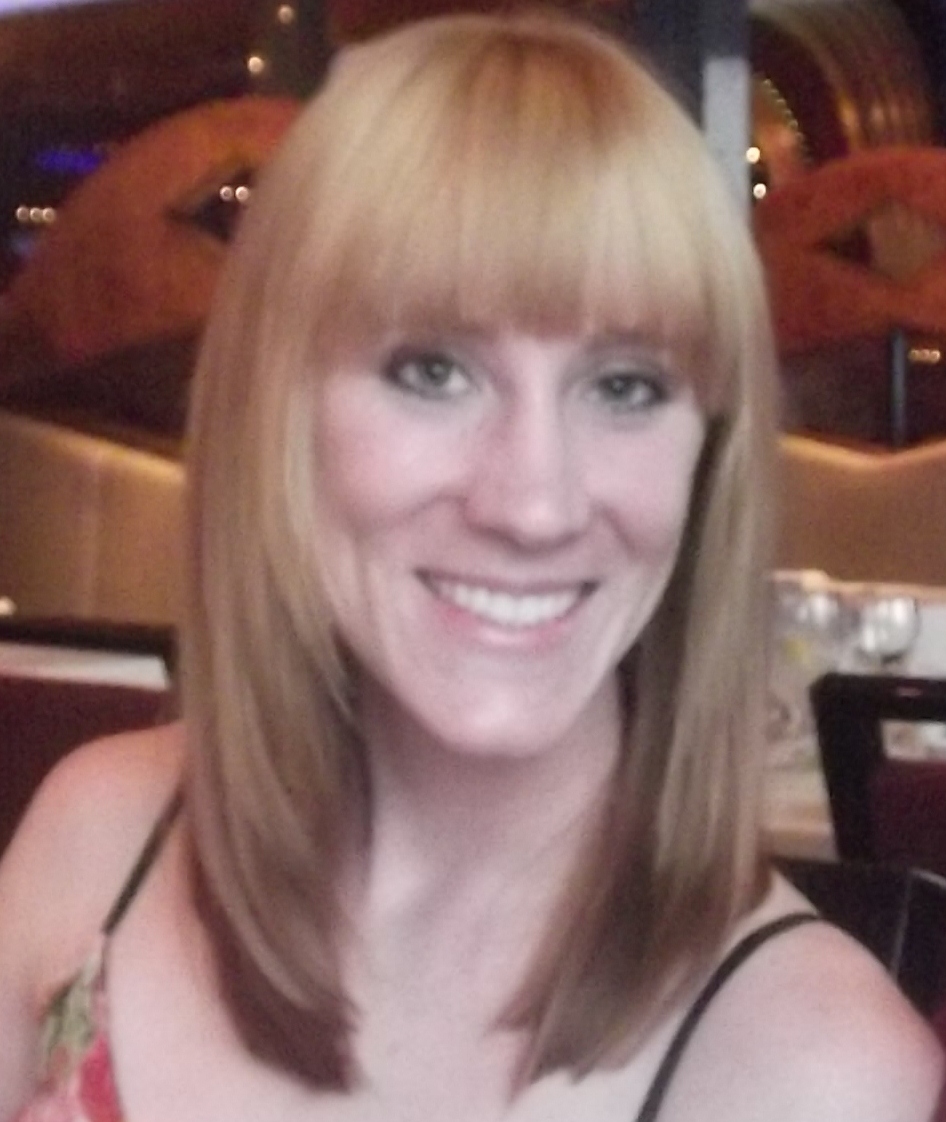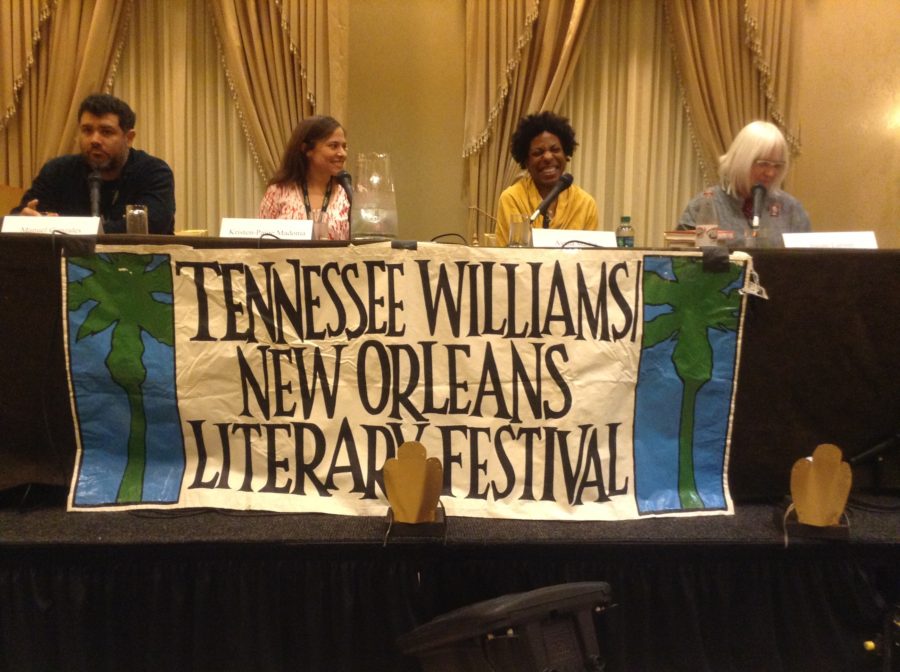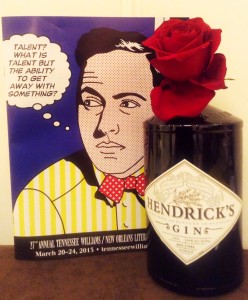loading...
Please welcome Writing & Editorial Intern, Amy Laws – winner of the 2013 Country Roads Short Story Fiction Contest and New Orleans-based writer – as she shares the first part of her series, “I Want to Be a Writer. Now What?” Here, Amy offers a thoughtful review of three writers who spoke at the 2013 Tennessee Williams Festival, quotes their experiences, and reflects with some ideas of her own. Welcome, Amy! – Helana
—
Part 1: I Want to Be a Writer. Now What?
by Amy Laws
27th Annual Tennessee Williams Literary Festival
March 20-24, 2013
Pictured: The festival program and one of Tennessee Williams’ favorite drinks, which was given out in liberal amounts during the festival – Hendrick’s Gin
“The Art of the Debut: Writers on their First Novel”
Q&A: Authors Manuel Gonzales, Kristen-Paige Madonia, Ayana Mathis, and Moderator Susan Larson
Friday, March 22, 2013
_________
 This year I volunteered at the 27th Annual Tennessee Williams Literary Festival in my hometown New Orleans, LA.
This year I volunteered at the 27th Annual Tennessee Williams Literary Festival in my hometown New Orleans, LA.
I graduated from LSU in Creative Writing this December and then moved back in with my mom. After a day or two—or was it a week or two? or perhaps a month?—of lounging about my house and watching movies, I said,
“Well, I suppose I should do something about this writing career I presume to eventually have (something besides, that is, being part of the inspiringly talented team at Clearly Delicious).”
So, I signed up to volunteer at the festival. And, with my mom’s somewhat forceful encouragement, I decided to attend some of the events and panels at the festival.
Pictured: Me, posing with Tennessee Williams, (unfortunately just his cardboard cut-out.)
I may have been a little afraid that there would be a group of elite writers who would turn a cold shoulder to someone as inexperienced as myself.
[You know these anxious feelings we sometimes get when venturing into unknown territory. Well, at least I know Cara and I do.]
How wrong I was!
I don’t believe I’ve been to any festival where the people were more welcoming, helpful, and friendly.
I walked into the Hotel Monteleone, the festival’s headquarters, and was taken aback by the beauty of the venue.
Pictured: Lobby of Hotel Monteleone
To the right: the famous Carousel Bar. To the left: a huge sign pointing me onward to the Tennessee Williams Festival, as well as a fellow volunteer who was already on duty. She smiled, greeted me, and complimented my shirt—a Doctor Who/TARDIS shirt that my fellow writers and nerds appreciated greatly.
Pictured: Festival sign
That morning, Friday, March 22nd, I knew what panel I wanted to see. I marched into the Queen Anne Ballroom, which was already half-full at 9:30 a.m., and found a seat to the right of the stage.
Pictured: Queen Anne Ballroom in the Hotel Monteleone
My panel wasn’t until 1:00 p.m., and you better believe that I sat there, slowly moving to the front row between panels —eating a homemade sandwich at some point—until that time. I dodged legs and toes, while working my way to seemingly available chairs. When up close, I realized said chairs were occupied by umbrellas or programs. But then I spotted some ladies discussing empty stomachs and a possible lunch outing. So I hovered.
[I hovered like I’ve been taught to do at places like the Café du Monde when searching for a table. And my Café Du Monde-hovering-skills payed off.]
As you will be able to tell from my audience Q&A video later in the article, I ended up seated in the exact middle front row. Success!
After conquering my front row chair, I chatted with fellow writers next to me. Veterans of the festival and newbies alike were glad to talk about their festival experiences. People from 16 to 80 years old with different jobs and areas of interest all wanted to improve their writing. This range encouraged me, in that it erased all preconceived notions that you must perfect the craft of writing at a certain age. The crowd at the festival just proves the simple fact that you’re never too young or too old to start your journey as a writer.
Although I attended many panels during the festival and plan to write about each of the panelists (as well as the hard-to-navigate field of writing and publishing they discussed), I’d like to start with my favorite panel.
On Friday, March 22, I was willing to wait over 3 hours for—
“The Art of the Debut: Writers on their First Novel”
Pictured: (left to right) Authors Manuel Gonzales, Kristen-Paige Madonia, Ayana Mathis, and Moderator Susan Larson. Video of insightful questions and answers from the Audience Q&A with the Authors. Don’t worry, video becomes less shaky after first 30 seconds.
The “Art of the Debut” panel consisted of first-time published authors who spoke of their personal woes and triumphs while writing and publishing their debut work.
Manuel Gonzales discussed his book “The Miniature Wife: and Other Stories” as well as “writing what you know” and how to write a collection of short stories.
Kristen-Paige Madonia discussed about her book “Fingerprints of You” as well as “writing what you don’t know” and how entering writing contests can help an aspiring writer.
Ayana Mathis discussed about her book “The Twelve Tribes of Hattie” as well as her “love-hate relationship with writing” and her phone call from Oprah Winfrey.
Susan Larson moderated the panel by asking the authors questions and keeping them on topic. Susan is the host of The Reading Life on a New Orleans public radio outlet WWNO 89.9, and is the author of “The Booklover’s Guide to New Orleans.”
Pictured: (left to right) Authors Manuel Gonzales, Kristen-Paige Madonia, Ayana Mathis, and Moderator Susan Larson
7 Questions & Many Answers:
Below: All the questions from Moderator Susan Larson and a summary of the authors’ answers in bullet point format. My own comments and advice are listed after, “NOTES.”
Question: When did you know you were really embarking on your book?
- Manuel: “When you get an idea you can’t let go of.”
-
Kristen-Paige: “When that idea becomes a product of frustration. Another product of frustration is publishing and the hardships of marketing.”
NOTES: Kristen-Paige discussed a book she wrote, which she and her agent were unable to get published. After much frustration, many feelings of doubt, and tears, what enabled her to move forward and start work on her new book was just knowing that she was “on to something.” But, just because you are “on to something” doesn’t mean that writing and developing that idea won’t be hard or perhaps even cause more tears.
Question: Where and how do you start your story or project?
“The first line of the book is everything.”
NOTES: Susan had each author read the first sentence from his or her book. Barely a breath was heard as each author did so. Small “Ooh’s” and “Aaw’s” erupted from the audience as they finished. The audience’s attention was captured so much so that I and many others went to buy each author’s book after the panel ended.
-
Manuel: “Don’t put a completely outlandish unexpected twist at the end.” Sometimes it is good to let readers know up front that something strange and outlandish is going on, and then continue to develop your character’s problems in that situation or setting.
-
Kristen-Paige: “Start with the character and develop the character’s voice.” Write in the voice of the character a lot. That’s how you can figure out who the character is and how the character would respond to certain conflicts and situations you go through every day. And then start your plot.
-
Ayana: “Know two or three important things about or wrong with your character.” Don’t obsess over the beginning of the book too much. You can go back to it after the entire plot plays out.
-
Manuel: And sometimes what you start with ends up in the middle or near the end of the story.
-
Kristen-Paige: “And that’s the beauty of cut and paste.”
NOTES: It really depends on what you as a writer are most comfortable starting with: character, plot, conflict, or setting. I even came up with one interesting sentence once, and ended up building a story around that one sentence. Whatever you choose to begin with, it is important to make sure you are disciplined. Keep writing, even if you go back later and decide to put none of what you’ve written in your final story. Anything and everything you write will help you to develop your work.
Question: How do you sell your book?
-
Manuel: “Most importantly write what you want, and don’t worry about whether it will sell or not.”
NOTES: Make sure you believe in your work. Manuel was with his former agent for about 6 years. Manuel wrote his collection of short stories, and his agent kept delaying looking for an editor. His agent made excuses like “short story collections just aren’t selling right now.” Manuel was extremely distressed, and started to lose faith in his work. After two years of his agent not doing anything to get his book published, his friend simply suggested that he get a new agent. He did. Manuel’s new agent, P J Mark, sold his collection in a week. So, have faith in you work and don’t let anyone hold you back.
Question: Did you ever want to give up on your book?
- Ayana: “It’s a love-hate relationship.”
- It took a while to accomplish. The relationship between Ayana and her book was that of a “bad lover”:
“I love you. I want to be with you forever. Then, I hate you. Get out of my life. Then wait, I think I still love you.”
–Ayana Mathis, “The Twelve Tribes of Hattie”
- Ayana wrote her first book in graduate school and eventually sold it to an editor. In another year and a half it was published.
- Ayana got a call from Oprah Winfrey, herself, while she was in Paris no less, informing her that her first book was now part of Oprah Winfrey’s Book Club.
NOTES: You may need to spend some time away from your writings, but that doesn’t mean they aren’t worth coming back to. In fact, you should spend some time away from your story instead of trying to edit it every day. I find that editing becomes easier and faster once I spend a few weeks, or months, or years away from my writings. I go back to them with a completely new perspective and fresh outlook on ideas from story plots to sentence structures that help make my stories flow better.
Question: How does entering a writing contest help your development as a writer as well as your career?
-
Kristen-Paige: When you do win a writing contest it helps to encourage and validate your talent.
-
Kristen-Paige is the winner of the Tennessee Williams 2nd Annual Fiction Contest.
NOTES: When it comes to writing contests, look at previous winners and their stories to see what has been popular in the past. Also, research the judges to see what kind of works they have published. Keep the past contest winners’ and judges’ writing styles in mind, but still make your story your own, and not a copy of others’ works. Make sure you read all rules before submitting your story. If formatting is wrong or the word count is exceeded, your story will be thrown out.
Entering contests helps with practicing your craft even if you don’t win the contest the first time you enter. I have entered many fiction contests, but it was a few years before I actually won one. I recently won the Country Roads Magazine Fiction Contest. My story “The Living” will be in the June 2013 issue and can be found online here.
Question: How do you know when your collection of short stories is done?
-
Manuel: “When you have a similar theme and voice in the stories. Notice an element you may be repeating and keep that in mind as you continue writing your collection.”
NOTES: Writing similarly themed stories may be easier than you think. We all go through many experiences and stages in our lives that affect our writing. Each experience (or theme) can lend itself to countless writings before you move on to a new life experience (or new theme) in a new line of writings. I started writing 5 years ago and I still find the same theme cropping up in my stories. One can see that my story “The Living” deals with the themes of death, loss, and denial. Yes, I have dealt with these themes in many of my stories, but always with different characters, settings, and situations so that the themes can be explored from different angles.
Question: How do you feel now that the public has something you wrote in their hands?
-
Manuel: “It’s hard to explain it. It feels like they’re talking about someone else’s book and not something you spent all this time and heartache on writing, especially when it is a good review.”
-
Ayana: “I’m moved by the generosity with which this book has been received. I got a letter from a woman and the last line of the letter said, ‘I want to tell you this: Never be discouraged.’”
-
Kristen-Paige: “You are afraid you’ll get a comment like –
‘How do you have the right to write what you know nothing about?’ – but I push against writing what you know. I write things I know nothing about and no one has gotten angry with me yet. I was actually thanked for writing a non-MTV teen mom story.”
–Kristen-Paige Madonia, “Fingerprints of You”
NOTES: Both Ayana and Kristen-Paige discussed how meeting YA (Young Adult) readers is rewarding, and the feedback they receive amazes them. However, while doing a Q&A with YA readers, Ayana and Kristen-Paige are always wary of inappropriate questions that children and teens sometimes ask.
-Amy
—
 Amy Laws is a recent LSU English and Creative Writing graduate, who couldn’t be happier than when she’s discussing a book or movie in depth. This March, Amy won the Country Roads Magazine’s short story contest with her story “The Living,” and will be published in their June 2013 issue. Her story can also be found online here.
Amy Laws is a recent LSU English and Creative Writing graduate, who couldn’t be happier than when she’s discussing a book or movie in depth. This March, Amy won the Country Roads Magazine’s short story contest with her story “The Living,” and will be published in their June 2013 issue. Her story can also be found online here.
Amy is one of our four Editorial and Writing Interns specializing in a wide variety of projects—articles and essays, recipes and recipe writing, and creative short stories–about living and eating in Louisiana. According to past teacher and mentor James Wilcox, Amy “has a nack for editing.”
Contact: amy [at] clearlydeliciousfoodblog [dot] com
Follow Amy on Pinterest: http://pinterest.com/amycollierlaws/
_____
Follow Helana on Pinterest: http://pinterest.com/helana/
Twitter: https://twitter.com/DancesWLobsters
Facebook: https://www.facebook.com/pages/Clearly-Delicious/103136413059101
Tumblr: http://clearlydelicious.tumblr.com/
Instagram: http://instagram.com/helanabrigman
Part 1: I Want to Be a Writer. Now What?,



No Comments